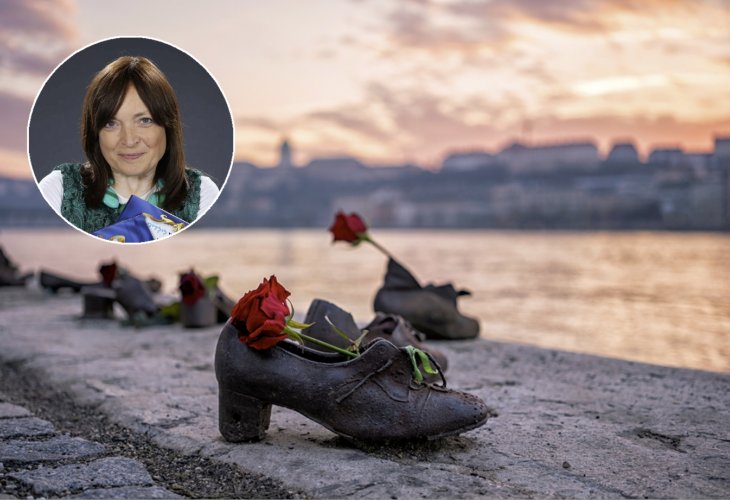What Should We Tell Children About the Holocaust?
Sometimes we get hurt, but do we cry all the time? No. There are also good things in the world, much more good, and we should focus on it.
- מנוחה פוקס
- פורסם כ"ד ניסן התשע"ט
 (Photo: shutterstock)
(Photo: shutterstock) #VALUE!
The Holocaust affects us all year round. We all know Holocaust survivors and their families. We've all heard, read, or seen the horrors, but our children don't exactly know. It's not certain someone has told them, and it's not sure they're ready to hear these stories.
Should we tell small and young children about the Holocaust? - Parents repeatedly ask me.
One father asked for guidance: "My mother is a Holocaust survivor. She wants us to remember. She wants us to tell. I often talk about her hardships, but my son is 4 years old, and I'm not sure if it's appropriate."
Another mother sought my advice: "My child is in first grade. He is extremely sensitive to any story of suffering. How can I explain to him what happened during the Holocaust without scaring him too much?"
It is difficult to explain something so terrible in a way that isn't frightening, but it is even harder not to tell at all, and then the child will hear from other sources and might become so frightened that it leads to anxiety.
We, as parents, are supposed to mediate what happens in the world to our children. We shouldn't rely on anyone else to do this for us, and we cannot control or know exactly what the child's teacher will say in class, how the children will react, or what they will answer.
It is clear and certain that when we mediate things appropriately, the child will absorb them differently than if left to rumors and books.
Every child who understands must know there was a Holocaust. If they don't learn it from us, they'll hear it from the street, and no one knows in what form.
To young children in kindergarten, we tell about the Holocaust as they have heard about the evil Antiochus during Chanukah, Ahasuerus or Haman during Purim, and Pharaoh during Passover. "Once, many years ago, there was an evil nation..."
To remember the Holocaust, here in our country we have a memorial siren. Even a 4-year-old may become frightened if we don't prepare them for it (some children may not distinguish between a siren and an alarm, especially in certain areas of the country). We tell them: "There's nothing to fear from the siren! It's meant to remind us that there were bad days, when bad people did bad things to others."
An older child won't be satisfied with that. They will ask more and request details. For such a child, usually 6 or 7 years old and in school, we tell a bit more. A little, and no more.
We tell them about the disaster that befell the Jewish people, about their grandfather, or their father's grandfather, who may still be alive.
We tell about the neighbor they know, the elderly uncle, or the shopkeeper.
We talk at length about those who survived. We tell of Hashem's kindness that led to that (focusing more on the living, less on the deceased and murdered), and above all, we let the child ask questions and answer sincerely and honestly.
What might a child ask?
"Why did they do such terrible things?"
We explain to them that this is the way of the world, not everyone is good and righteous. We teach ourselves to be righteous, but others did not learn this. We also explain that we are Jews and we have the Torah, while others do not.
They might ask if that bad man could do anything to us too.
We explain that that person is no longer alive. We pray to Hashem that there won't be such people in the world again.
They might ask if the elderly person: grandfather, uncle, or neighbor, is sad all the time because of this.
We explain that sometimes people do get harmed, but do we cry all the time? No. There are also good things in the world, much more good, and we should focus on it.
Pay attention that almost everything we teach ourselves – we can teach our children as well, the question is just how we tell them and how much we reveal to them.
To an older child, we can tell more and more. At their age, they will also read books on the subject, and we will no longer be the sole providers of information.
The more we talk about good, about what exists, about the Torah and the commandments that uphold the world, and the less we tell the young child about darkness, they will receive things in proportion and won't fall into depression and anxiety because of them.
We must be very careful of stories that are too frightening, of terrible sentences, of horrific descriptions
and of videos that will never leave their sight.
There are delicate and quiet children who will struggle to take things in and will retreat into themselves, while there will be those who mock at the dreadful things you've told them.
When children fail to digest and express the correct emotion, they react in different ways: retreating into themselves, laughing, or chatting with someone else. It's normal. It's a form of expression, and we need to accept it.
In class, children certainly hear about the Holocaust, but as parents, it is our duty to tell the child about what happened in that generation so that the next generation will remember the Holocaust, and no one will ever be able to forget it.

